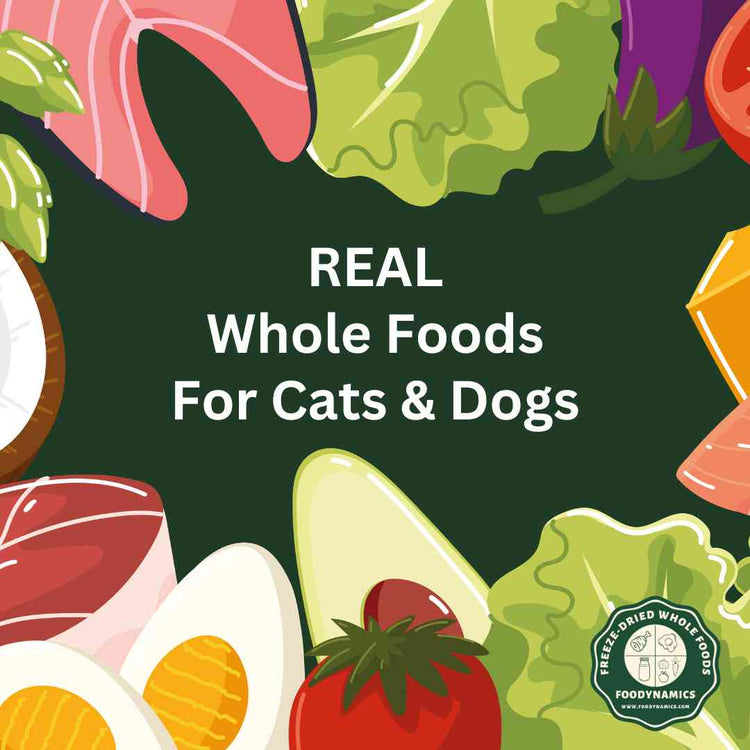Processed foods, with their enticing promises of flavor and nutritional benefits, are a common sight. Yet, despite their appeal, we are aware of the health risks they carry.
Interestingly, while no well-informed doctor would recommend increasing our intake of processed foods—urging us instead towards whole, natural foods—this wisdom often doesn't extend to our pets. Shockingly, about two-thirds of veterinarians recommend ONLY processed foods for dogs and cats, warning that a diet of real foods might be harmful (Freeman et al., 2013).
However, if neither humans nor our pets were meant to thrive on whole foods, surely our species wouldn't have survived this long. The essential role of whole foods in maintaining health is clear and supported by research, which highlights the numerous advantages of a diet rich in natural foods over one filled with processed options (Ricci, 2017).
Whole foods—unprocessed and unrefined—include meats, fruits, vegetables, nuts, and seeds. They are packed with fiber, vitamins, minerals, and antioxidants, crucial for overall health (Slavin & Lloyd, 2012). Conversely, processed pet foods are often loaded with additives, preservatives, synthetic vitamins and excessive amounts of carbohydrates/sugar, sodium, and unhealthy fats (Ludwig et al., 2018).
Here are some significant benefits of a whole food diet for our pets:
- Weight Management: A meat-based whole food diet helps manage weight and prevent obesity-related issues such as diabetes, heart disease, and joint problems in dogs and cats (Laflamme, 2012).
- Enhanced Energy Levels: High-quality, real meat provides sustained energy, avoiding the peaks and troughs associated with carbohydrate-heavy diets (Bosch et al., 2010).
- Cognitive Health: Whole foods fuel the brain, potentially enhancing cognitive functions and helping prevent neurodegenerative diseases (Milgram et al., 2005).
- Potential Cancer Prevention: Early studies suggest that whole food meat diets could help reduce or slow the growth of cancer cells by depriving them of glucose, their preferred energy source (Klement & Champ, 2014).
Pet foods are often overly processed, high in carbohydrates/sugar, and deficient in essential nutrients. Additionally, the ingredient percentages on pet food labels can be misleading, almost always omitting carbohydrate content, which many pets cannot safely digest in large amounts (Zoran, 2002). Excessive carbohydrate intake can lead to a host of health problems, including pancreatitis, diabetes, cancer, allergies, inflammation, immune disorders, joint issues, and more (Rand et al., 2004).
The solution is rooted in our instincts: real, whole foods. It's time to honor nature's wisdom, prioritize our pets' health, and embrace the power of whole foods in their diets. Let’s nourish our pets as nature intended.
References
Bosch, G., Hagen-Plantinga, E. A., & Hendriks, W. H. (2010). Dietary nutrient profiles of wild wolves: insights for optimal dog nutrition? *Journal of Nutrition*, 140(1), 673-679.
Freeman, L. M., Chandler, M. L., Hamper, B. A., & Weeth, L. P. (2013). Current knowledge about the risks and benefits of raw meat-based diets for dogs and cats. *Journal of the American Veterinary Medical Association*, 243(11), 1549-1558.
Klement, R. J., & Champ, C. E. (2014). Calories, carbohydrates, and cancer therapy with radiation: exploiting the five R's through dietary manipulation. *Cancer and Metabolism*, 2(1), 16.
Laflamme, D. P. (2012). Pet obesity management: beyond nutrition. *Veterinary Clinics of North America: Small Animal Practice*, 42(2), 789-806.
Ludwig, D. S., Willett, W. C., Volek, J. S., & Neuhouser, M. L. (2018). Dietary fat: From foe to friend? *Science*, 362(6416), 764-770.
Milgram, N. W., Head, E., Zicker, S. C., Ikeda-Douglas, C. J., Murphey, H., Muggenburg, B. A., ... & Cotman, C. W. (2005). Learning ability in aged beagle dogs is preserved by behavioral enrichment and dietary fortification: a two-year longitudinal study. *Neurobiology of Aging*, 26(1), 77-90.
Rand, J. S., Fleeman, L. M., Farrow, H. A., Appleton, D. J., & Lederer, R. (2004

